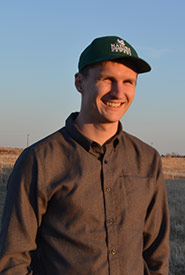Summer intern interviews: Meet the fresh faces of NCC's Saskatchewan Region (Part two)
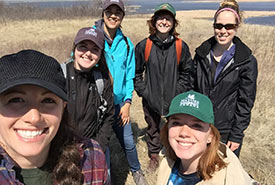
Summer interns of NCC's Saskatchewan region (Photo by NCC)
Summer interns help the Nature Conservancy of Canada (NCC) complete valuable science and education projects across the country. In part two of this two-part series, we continue to learn about our summer interns from NCC's Saskatchewan Region. Read part one here >
Morgan Kanak
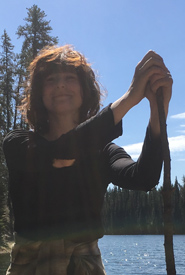
Morgan Kanak
Morgan grew up in Saskatoon and currently studies applied plant ecology at the University of Saskatchewan. This summer she is working for the Nature Conservancy of Canada as a natural areas assistant in Regina.
LS: What led you to conservation?
MK: I have enjoyed the outdoors my entire life, and I’ve always had a passion for plants. I felt like nature wasn’t given the respect it deserves. It just made sense to combine my two passions and pursue a career in conservation.
LS: How has the NCC intern program helped you?
MK: Well, it has certainly improved my birding skills, but beyond that it has also helped me create a network of like-minded individuals to talk to. Modern conservation is too complicated for any one person, and so the networks that I am creating will impact the conservation decisions I make in the future.
LS: Do you have a favourite plant?
MK: I love plants so much that it is hard for me to pick just one. But if I had to pick I would say sweet grass. It is always a pleasure to find because it smells so sweet. It is also considered sacred to many First Nations peoples because it is used in ceremonies and thought to have healing effects. It really is one of the most beautiful smells on the prairies.
LS: What excites you about the future of conservation?
MK: Conservation is changing and becoming more open to working together. I think a huge part of conservation in the future is going to be about collaboration. I have seen that at NCC, whether it is coordinating with landowners or bringing together a large team to complete a prescribed burn. NCC is always coordinating with other partners.
LS: What worries you about the future of conservation?
MK: The amount of plastic we use as a society is worrying. I see positive change on the horizon, but we need to realize the destructive impact of plastic pollution on the environment. I worry that we aren’t acting fast enough to curb our plastic use, but I am also hopeful to see change.
LS: If you could tell the world one thing, what would it be?
MK: You don’t have to look far to find beauty. Especially in Saskatchewan. People often think you have to visit the other side of the world to see beautiful nature, but they are missing the beauty in their own backyards.
Madeline Weafer
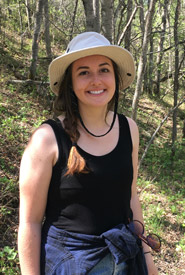
Madeline Weafer
Madeline grew up in Regina and attends the British Colombia Institute of Technology in Burnaby, BC. She is studying to receive her bachelors of science degree in ecological restoration. She is working this summer as a natural areas assistant in NCC’s Regina office.
LS: What led you to conservation?
MW: I always enjoyed being outside as child, but it wasn’t until I was older that I realized that it takes real work to protect wildlife.
LS: Do you have a favourite plant?
MW: My favourite plant is any vetch from the prairie pea family. They are very pretty and dainty with little flowers. They are a little bit of softness in what can be a harsh prairie climate.
LS: What excites you about the future of conservation?
MW: Large-scale projects like the Y2Y project (Yellowstone to Yukon) get me really excited. When I hear about massive collaborative projects like Y2Y that require multiple organizations, countries and levels of government but are still able to be widely successful, it excites me to see what the future of conservation will be.
LS: What worries you about the future of conservation?
MW: I often worry that not enough people care. I think experiencing nature first-hand is a powerful tool to overcome apathy, but not enough people get to experience it. I hope that more kids can experience nature and understand how important it is.
LS: If you could tell the world one thing, what would it be?
MW: Plants and animals were living here on Earth long before humans came along. We need to consider that it is their home too. Earth is home to all life, and we need to think about how we are treating our home.
Ashley Sahulka
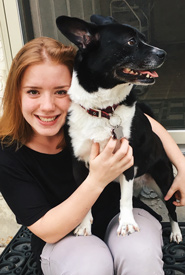
Ashley Sahulka
Born in Swift Current and raised in Regina, Ashley is now studying at the University of Regina, working toward her bachelors of science degree with a focus on environmental studies and ecology.
LS: What led you to conservation?
AS: I love animals of all shapes and sizes, so that was one of the reasons that I was drawn to conservation. I was also introduced to nature through family camping trips, and I always wanted other people to experience it. Too many people are missing out on amazing natural experiences.
LS: What led you to NCC?
AS: As a teenager I went hiking on a couple of NCC properties and was curious about NCC and why they owned this beautiful land. I did some research and found that I loved their goals and vision. NCC is focused and driven, but also extremely practical and science-based. I knew it was an organization that I wanted to join. I was honoured that they chose me for the summer intern program.
LS: Do you have a favourite plant?
AS: I have two. I like to avoid it when I am in the field but I really like poison ivy. I think it is a cool representation of how evolution works and how plants evolve to protect themselves. I also like violets. Not everything in nature is friendly and beautiful, and that is okay. Sometimes you need something in your life like a violet that is both friendly and beautiful.
LS: What is your favourite memory of nature?
AS: When I was in elementary school, I was riding in the back seat of the car with my grandparents when my grandfather pointed out a whooping crane soaring overhead. Even though I was fairly young at the time, I had a sense of how special and rare that moment was. It left a real deep impression on me.
LS: Where do you see yourself in 10 years?
AS: It is so hard to predict, but I hope to continue the path I am on right now. I will be hopefully working for NCC, or an institution that has the same strong values. I chose my current career path so that I could aid conservation, so I am sure I will be doing that in some way. I also hope I have a dog!
LS: If you could tell the world one thing, what would it be?
AS: Practically, I would tell people to reduce their carbon footprint wherever they can. But I would also tell people to go out into the world and look around. It is so simple, but I think sometimes people forget to do that.
The Conservation Internship Program is funded in part by the Government of Canada’s Summer Work Experience program.

